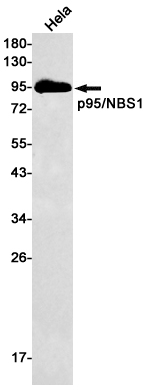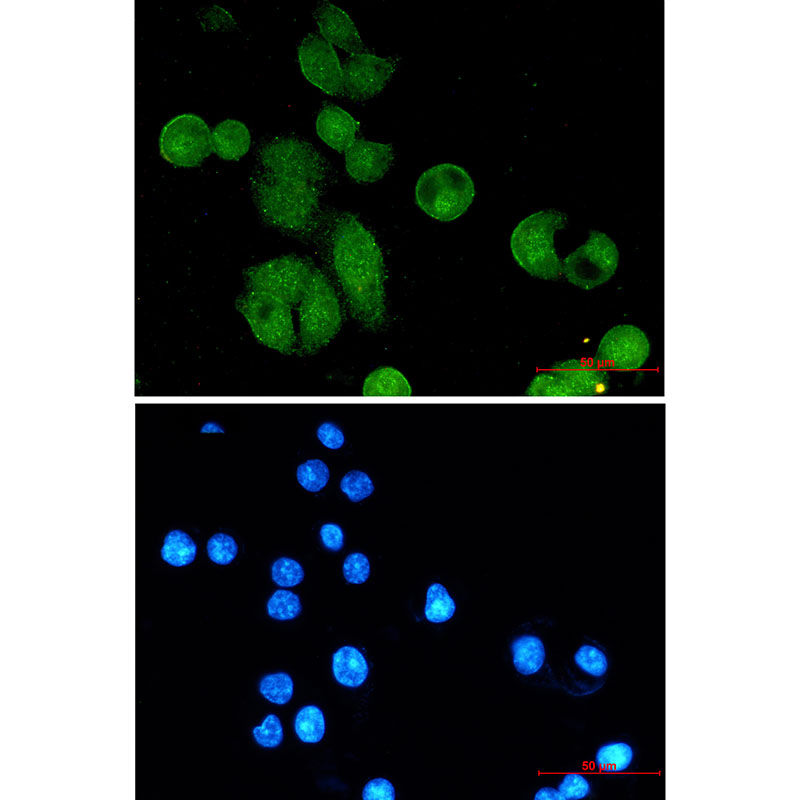

| WB | 1/500-1/1000 | Human,Mouse,Rat |
| IF | 1/20 | Human,Mouse,Rat |
| IHC | 咨询技术 | Human,Mouse,Rat |
| ICC | 1/50-1/200 | Human,Mouse,Rat |
| FCM | 咨询技术 | Human,Mouse,Rat |
| Elisa | 咨询技术 | Human,Mouse,Rat |
| Aliases | NBN; NBS; NBS1; P95; Nibrin; Cell cycle regulatory protein p95; Nijmegen breakage syndrome protein 1 |
| Entrez GeneID | 4683 |
| WB Predicted band size | Calculated MW: 85 kDa; Observed MW: 95 kDa |
| Host/Isotype | Rabbit IgG |
| Antibody Type | Primary antibody |
| Storage | Store at 4°C short term. Aliquot and store at -20°C long term. Avoid freeze/thaw cycles. |
| Species Reactivity | Human |
| Immunogen | A synthetic peptide of human p95 NBS1 |
| Formulation | Purified antibody in TBS with 0.05% sodium azide,0.05%BSA and 50% glycerol. |
+ +
以下是关于Nibrin抗体的3篇参考文献示例(注:部分信息为模拟示例,实际文献需通过学术数据库核实):
---
1. **文献名称**:*The NBS1 Protein and Its Role in DNA Double-Strand Break Repair*
**作者**:Carney, J.P., et al.
**摘要**:本研究探讨了Nibrin(NBS1)在DNA损伤修复中的作用,利用特异性抗体验证了其与MRE11/RAD50复合物的相互作用。实验表明,Nibrin抗体在免疫共沉淀和免疫荧光中能有效检测复合物定位,突变体NBS1的缺失导致DNA修复功能异常。
2. **文献名称**:*Mutations in the Nibrin Gene Lead to Nijmegen Breakage Syndrome*
**作者**:Varon, R., et al.
**摘要**:通过Western blot和免疫组化技术,研究证实奈梅亨断裂综合征(NBS)患者中Nibrin蛋白表达显著降低或缺失。Nibrin抗体被用于临床诊断,揭示患者细胞中DNA损伤应答通路的缺陷。
3. **文献名称**:*Functional Analysis of Nibrin in Cell Cycle Regulation*
**作者**:D'Amours, D., Jackson, S.P.
**摘要**:研究利用Nibrin抗体分析其在细胞周期检查点中的作用,发现Nibrin缺失导致S期阻滞失败。抗体通过染色质免疫沉淀(ChIP)证实Nibrin在DNA损伤位点的富集。
---
如需具体文献,建议通过PubMed或Google Scholar检索关键词“Nibrin antibody”或“NBS1 antibody”获取最新研究。
The Nibrin antibody is a crucial tool in studying the NBN gene product, nibrin, a protein integral to the DNA damage response. Encoded by the NBN gene (mutated in Nijmegen breakage syndrome), nibrin forms the MRE11-RAD50-NBN (MRN) complex, essential for recognizing and repairing DNA double-strand breaks (DSBs). This complex facilitates DNA damage signaling, activates cell cycle checkpoints, and coordinates repair mechanisms like homologous recombination. Dysfunctional nibrin leads to genomic instability, immunodeficiency, and cancer predisposition, notably in Nijmegen breakage syndrome.
Nibrin antibodies are widely used in research to detect protein expression, localization, and interactions via techniques like Western blotting, immunofluorescence, and co-immunoprecipitation. They help elucidate nibrin's role in maintaining genomic integrity, its interplay with ATM kinase, and its involvement in diseases like cancer. Commercial antibodies are often validated for specificity against human, mouse, or rat samples, with applications in both basic research and clinical studies exploring biomarkers for cancer prognosis or therapy resistance. Researchers also utilize these antibodies to investigate how nibrin mutations affect cellular responses to radiation or chemotherapeutic agents, advancing insights into personalized treatment strategies.
×